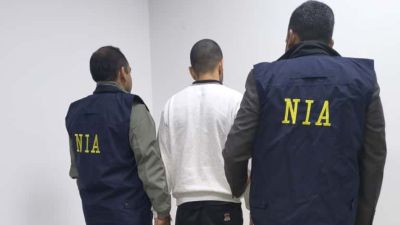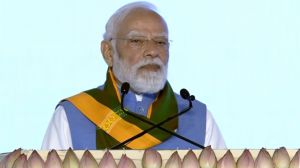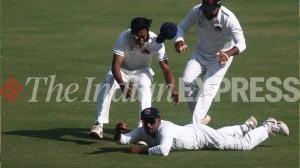“Every great spy story is also a secret history of bureaucracy;” so observed Zach Dorfman’s rip-roaring Rolling Stone article about a mysterious CIA operative who was embedded so deeply inside the Taliban that he presumably began participating in global terror himself. A thrilling account of international espionage and the human toll that it takes on those tasked with carrying it out, the story also highlighted the flagrant red-tapeism through which life-and-death decisions were made on the operative’s behalf, often without his knowledge. Director Anubhav Sinha’s Netflix series IC 814: The Kandahar Hijack — an immaculately constructed, darkly humorous, and ultimately terrifying exposé of the “babugiri” that routes our lives — plays like an excellent companion piece to that article.
Divided into two halves of three episodes each — the first focuses on the infamous hijacking and the second details the ensuing negotiations — the show owes about as much to the Jason Bourne movies as it does to the satirical sitcom Ji Mantriji. If Farooq Shaikh were alive, he’d have almost definitely found a place among the show’s excellent ensemble. Vijay Varma plays the unfortunate captain of the cursed Indian Airlines flight that was hijacked from Kathmandu in the winter of 1999, while the others — Kumud Mishra, Naseeruddin Shah, Manoj Pahwa, Pankaj Kapur, Dibyendu Bhattacharya, Arvind Swamy, and more — play versions of the same middle-manager torn between a sense of duty and the very Indian instinct of self-preservation.

Also read – Bheed: Anubhav Sinha’s movie is a messy, confrontational, and deeply angry response to blasé Bollywood
Story continues below this ad
 Vijay Varma as Captain Sharan Dev in IC 814: The Kandahar Hijack.
Vijay Varma as Captain Sharan Dev in IC 814: The Kandahar Hijack.
The Kandahar Hijack expertly unmasks the functioning of “desi” organisations, where those disallowed from exercising actual authority are often given an illusion of power, almost like a consolation prize. Terrified of being reprimanded by equally ineffectual bosses, these people are in a perpetual state of evading responsibility. This would be largely harmless in a corporate environment, but what if the same ethos were imposed on the highest levels of government, especially during an international crisis like the IC 814 hijacking? It’s a scary idea, but one that Sinha is able to make with single-minded efficiency across six episodes.
From the very beginning, it’s clear that while the hijacking was made possible by an intelligence failure, it was allowed to succeed only because uncles with little understanding of what to do spent more time trying to pass the buck and calling for more chai-coffee than taking action. When the captain, played by a supremely composed Vijay Varma, sends a sneaky distress signal to the Varanasi ATC, it is quietly decided by the man in charge that the authorities in Delhi will handle the mess because that’s where the flight is headed.
This is the same mentality that comes to haunt our characters deep in the series’ final episode, when the hijacked plane is stranded on a dry patch of land in Kandahar. The hijackers are caught in a stalemate with Indian negotiators, led by Mukul Mohan, the IB operative played so wonderfully by Pahwa. “Tees minute, andar ghus kar thok dete hain,” he says in a moment of frustration, after his tactics have predictably fallen flat. “Why didn’t we do it a week ago?” replies DRS, the cool-headed MEA secretary played by Arvind Swamy. “Because none of us wanted to take the onus.”
 Manoj Pahwa as Mukul Mohan in IC 814: The Kandahar Hijack.
Manoj Pahwa as Mukul Mohan in IC 814: The Kandahar Hijack.
Even the decision to appoint Mukul Mohan the lead negotiator — “There is too much of democracy in this country,” he ironically declares in one scene — is one marked by bureaucratic buck-passing. Ranjan Mishra, his counterpart from the R&AW, is initially selected to lead the operation in Kandahar, but he suggests to the Crisis Management Committee that Mukul would be harsher on the hijackers, and therefore better suited for the job. In order to save himself from an inquiry in the event of a mishap, Ranjan put the lives of 200 hostages at risk. For all we know, the only reason why Mukul didn’t nominate a third person is probably because he’s a bit of an opportunist who realises that regardless of how this turns out, he’ll receive a pat on the back for at least trying.
Story continues below this ad
What follows is perhaps the most effortlessly entertaining portion of the show, during which Pahwa makes the frankly inspired choice to play Mukul Mohan like an entitled BSNL customer care guy who has been disturbed during lunch hour. Even the hijackers can’t believe that they’re being made to strike a deal with a man so “sarkari” that he would’ve automatically attracted a consultancy offer from Prashant Kishore had he been born a couple of decades later. It’s almost as if Mukul is performing for an audience; he looks here and there for reactions, gestures flamboyantly with his hands, and pauses for imaginary applause. If there was a mic in his hand, he’d have dropped it. It’s a performance within a performance — the best kind, really — but one that drives home a rather sobering point: This is the guy who’s going to decide if we go to war or not; a man who nearly blew the entire operation by antagonising everybody around him?
Read more – Article 15: Ayushmann Khurrana plays an ally for the ages in the best film of Anubhav Sinha’s career
 (L to R) Dibyendu Bhattacharya as Abhijeet Kumar, Manoj Pahwa as Mukul Mohan, Arvind Swamy as DRS, Kumud Mishra as Ranjan Mishra in IC 814: The Kandahar Hijack.
(L to R) Dibyendu Bhattacharya as Abhijeet Kumar, Manoj Pahwa as Mukul Mohan, Arvind Swamy as DRS, Kumud Mishra as Ranjan Mishra in IC 814: The Kandahar Hijack.
But unlike Vikramaditya Motwane, who avoided indicting the party in power by drawing parallels to the past in his still-unreleased documentary Indi(r)a’s Emergency, Sinha makes the curious choice to absolve these characters, and by extension the government, of any wrongdoing. By suggesting that they all meant well, he appears to be saying that this was a systemic failure, not a moral one. Sinha drives home this idea in a memorable scene towards the end, where Pankaj Kapur’s Minister of External Affairs delivers an already sentimental line with the sort of jaw-dropping pizzazz that could earn him an Emmy nomination: “Aiye, chaliye, apne logon ki jaan bachate hain…”
None of these people really knew what they were doing, the show says; and it’s a bit of a miracle that more people didn’t die. Pakistanis had to be parlayed with, chief ministerial egos had to be massaged; rescuing innocent civilians needn’t have been this difficult, but life rarely resembles an Akshay Kumar movie. “So, we won?” a character asks in the climax, and DRS replies, “Did we?”
Story continues below this ad
Post Credits Scene is a column in which we dissect new releases every week, with particular focus on context, craft, and characters. Because there’s always something to fixate about once the dust has settled.




 Vijay Varma as Captain Sharan Dev in IC 814: The Kandahar Hijack.
Vijay Varma as Captain Sharan Dev in IC 814: The Kandahar Hijack. Manoj Pahwa as Mukul Mohan in IC 814: The Kandahar Hijack.
Manoj Pahwa as Mukul Mohan in IC 814: The Kandahar Hijack. (L to R) Dibyendu Bhattacharya as Abhijeet Kumar, Manoj Pahwa as Mukul Mohan, Arvind Swamy as DRS, Kumud Mishra as Ranjan Mishra in IC 814: The Kandahar Hijack.
(L to R) Dibyendu Bhattacharya as Abhijeet Kumar, Manoj Pahwa as Mukul Mohan, Arvind Swamy as DRS, Kumud Mishra as Ranjan Mishra in IC 814: The Kandahar Hijack.































